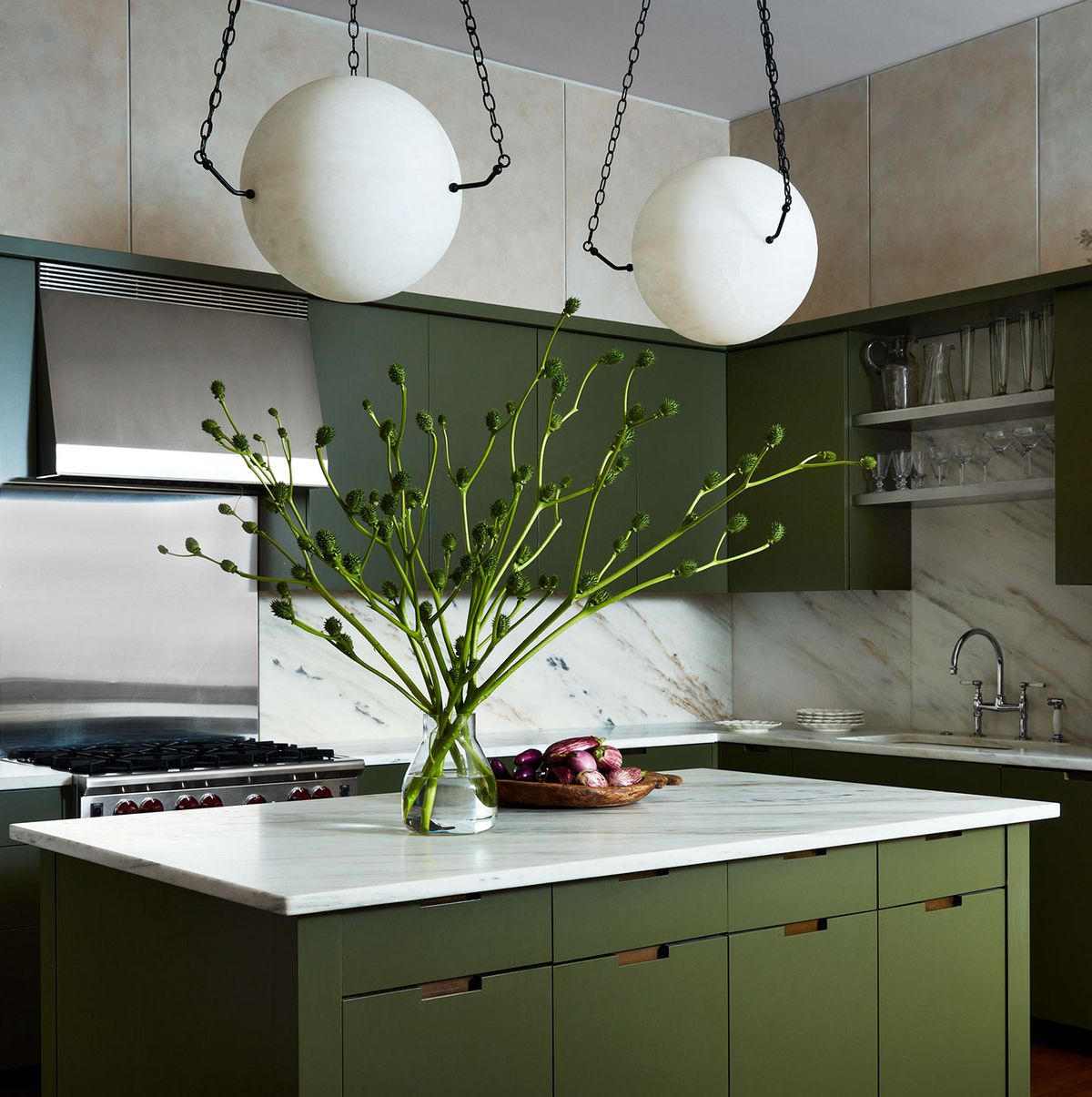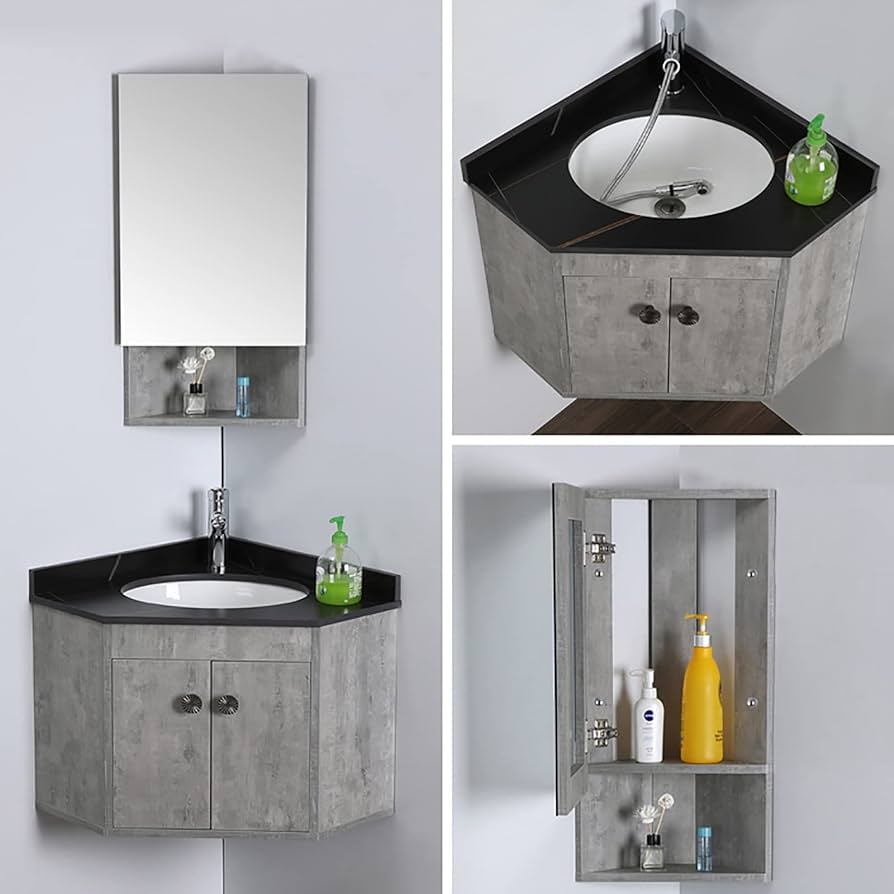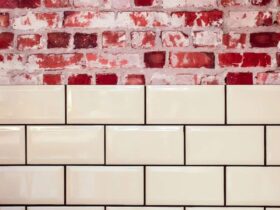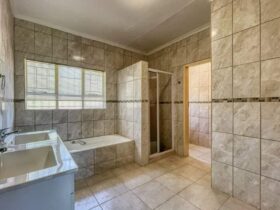Slate countertops are durable and elegant kitchen fixtures that offer a natural and rugged appearance. They are highly resistant to staining and heat, making them a popular choice for many homeowners.
Slate is non-porous, which means it is easy to clean and maintain, which is an added advantage. Slate countertops are often seen in rustic or classic kitchen designs and can make an eye-catching addition to any living space. While not as popular as granite or quartz countertops, slate countertops offer their own unique set of advantages and are often more affordable than other natural stone countertops.
We will explore the pros and cons of slate countertops and why they may be a suitable option for your kitchen renovation.

Credit: www.amazon.com
What Is Slate Countertops
Slate countertops are a rugged and unique natural stone option for kitchens and bathrooms. They offer durability and heat resistance, and their non-porous surface makes them easy to maintain. Slate is a more affordable option compared to granite or quartz countertops.
Definition
Slate countertops are known for their durability and are made from a natural stone that has been mined and quarried from the earth’s surface. Slate is a fine-grained rock, composed mainly of clay minerals, mica, quartz, and chlorite. It has an alternating composition of layers, which gives it its unique and natural look. Slate countertops come in a variety of colors such as black, gray, green, purple, red, and blue.
Characteristics
Slate countertops are non-porous, making them highly resistant to heat, scratches, and stains. This natural stone is easy to clean and maintain with just soap and water. Unlike other countertop materials, slate gets better with age and develops a wonderful patina. If you’re looking for a natural, warm, and unique countertop material, then slate is a great choice.
Slate Countertops Vs Top Countertop Materials
Slate countertops are a great alternative to traditional countertop materials such as granite, marble, and quartz. Here’s a quick comparison between slate countertops and other popular countertop materials:
| Countertop Material | Pros | Cons |
|---|---|---|
| Slate | Highly durable, heat-resistant, unique natural look, non-porous | May chip if heavy objects are dropped on it |
| Granite | Durable, heat-resistant, lots of color choices, long-lasting | Porous and needs yearly sealing, prone to chipping and cracking |
| Marble | Elegant look, easy to clean | Soft and porous, easily scratched and stained, high maintenance |
| Quartz | Durable, scratch-resistant, non-porous, lots of color choices | Not heat-resistant, may discolor with prolonged exposure to sunlight |
In conclusion, if you’re looking for a unique and natural alternative to traditional countertop materials, then slate countertops are a great choice. They offer a blend of elegance and durability and are relatively easy to maintain. Their heat-resistant and non-porous surface make them an ideal choice for a busy kitchen.

Credit: www.elledecor.com
Pros And Cons Of Slate Countertops
Slate countertops offer a unique blend of elegance and durability with their natural and rugged appearance. They are highly resistant to heat and staining with a non-porous surface that is relatively easy to maintain with slate oil. However, they may not be as widely available as other materials and can be prone to cracking if not installed properly.
a unique and attractive look for any kitchen. It offers a rustic, natural appearance and stands out from traditional countertop materials such as granite and marble. Slate countertops come with their own set of advantages and disadvantages. In this article, we will discuss the Pros and Cons of Slate Countertops in detail. We will also compare Slate vs. Granite Countertops, to help you make an informed decision.
## Pros of Slate Countertops
Slate countertops offer a unique and distinct look that is not found in any other natural stone. Here are some advantages of using slate as a countertop material:
– Durability: Slate is a highly durable material that can last for years with proper care and maintenance. It is resistant to scratches, chips, and cracks, making it an ideal material for high-traffic areas in your kitchen.
– Heat Resistance: Slate is a heat-resistant material, making it an excellent choice for the kitchen. It can withstand high temperatures without cracking or warping. You can safely place hot pots and pans on the surface of a slate countertop.
– Natural Beauty: Slate comes in different shades and finishes, offering a unique, natural look to your kitchen. Its textural and varied appearance can add character and depth to any kitchen décor.
## Cons of Slate Countertops
While slate countertops are highly durable, they also come with some downsides. Here are some disadvantages of using slate as a countertop material:
– Porosity: Slate is a porous material, which means that it can absorb stains and spills. If left unsealed, slate countertops can accumulate grime and bacteria, making it challenging to clean and maintain.
– Limited Color Options: Slate countertops are available in limited color options, primarily dark or gray shades. This can be a limiting factor in choosing slate as your countertop material if you are looking for a brighter and vibrant color palette.
– Cost: Slate countertops can be more expensive than other countertop materials, such as laminate or solid surface options. The cost can also vary depending on the quality and availability of the slate.
## Slate vs. Granite Countertops
Slate and granite are both natural stone materials used to make countertops. Here are some differences between the two:
– Appearance: Slate has a unique and natural rustic look, while granite has a more uniform look. Slate has a muted color palette with a rough texture, while granite has a polished finish with a shiny appearance.
– Durability: Both slate and granite are durable and can withstand high traffic kitchen areas. However, granite is more resistant to scratches and stains than slate.
– Maintenance: Slate requires more maintenance than granite, as it is porous and needs sealing regularly. Granite, on the other hand, requires minimal maintenance, as it is a non-porous material.
In conclusion, slate countertops are an excellent choice for those who want a natural and rustic look for their kitchen. Its unique appearance, heat resistance, and durability make it a popular choice among homeowners. However, it requires more maintenance than other countertop materials, and limited color options can be a downside. When compared to granite, slate has its own set of advantages and disadvantages. It ultimately comes down to personal preference and budget when choosing between the two materials.
Comparison With Other Countertop Materials
Slate countertops offer an elegant and durable option for your kitchen. Slate is highly resistant to heat and staining, with a non-porous surface that is easy to maintain with slate oil. While it may not be as common as other materials such as granite or quartz, slate is a unique and affordable choice.
Quartz Vs Slate
Quartz countertops are one of the most popular choices in the market. It’s made from an engineered material that is highly durable, non-porous, and has a uniform look. In contrast, slate countertops are natural stone, which can vary in texture and color. Slate offers a unique, rustic look that can make your kitchen stand out. When it comes to durability, both materials are known for their resistance to heat and staining. However, quartz is more forgiving when it comes to scratches and chips, while slate needs proper maintenance to avoid cracking or chipping.
Granite Vs Slate
Granite is a highly sought-after natural stone that is known for its durability and beauty. It’s been a popular choice for countertops for years due to its resistance to heat, scratches, and stains. However, slate has a unique charm that sets it apart from granite. Slate countertops offer a natural, earthy feel that can add warmth and character to your kitchen. Concerning durability, both materials are known for their toughness, but granite is more abrasion-resistant than slate.
Slate Vs Soapstone Countertops
Slate and soapstone are two natural stones that often get compared when it comes to countertops. Soapstone is known for its soft, smooth texture, and its heat-resistant properties. Like slate, soapstone is also non-porous and highly resistant to stains. However, unlike slate, soapstone requires regular maintenance to keep its natural beauty. Slate is also known for its durability, but it requires less maintenance than soapstone. When it comes to aesthetics, both offer unique color variations and textures that can add character to any kitchen.
In conclusion, comparing slate countertops to other materials can help you decide which one is right for your projects. While slate requires a bit more maintenance than other natural stones, it offers a unique look that can add character to your kitchen. Its durability, resistance to stains and heat, and affordable price make it a popular choice for homeowners seeking natural stone countertops.
Durability And Maintenance
Slate countertops are durable and require minimal maintenance due to their non-porous surface, making them resistant to heat and stains. Slate’s natural and rugged appearance adds a unique charm to any kitchen or bathroom. They are also a more affordable option than granite or quartz countertops.
low-maintenance surface that is perfect for busy kitchens. In this blog, we will discuss the durability and maintenance of slate countertops. We will focus on how they stand up to heat and stains, and how to maintain their natural beauty over time. Let’s dive in!
Heat Resistance
Slate countertops are incredibly heat resistant, which means they won’t be damaged by hot dishes or pots. Unlike other natural stones like marble or granite that can crack when exposed to high temperatures, slate can withstand extreme heat without any damage. This makes it a great choice for a busy kitchen where hot surfaces are common.
Stain Resistance
Slate countertops are also highly resistant to stains and spills, making them ideal for a kitchen countertop. Slate has a non-porous surface that makes it difficult for stains to penetrate, which means it is easy to clean and maintain. However, acidic substances like lemon or vinegar can etch the surface of the slate, so it is essential to wipe up spills as soon as possible to prevent any damage.
Maintenance
Slate countertops require relatively low-maintenance, which is why they’re a popular choice for kitchens. To keep them looking their best, it’s important to clean them regularly with a gentle cleanser and a soft cloth. Avoid abrasive cleaners and scrubbers as they can scratch the surface of the slate. Applying a slate oil periodically can help maintain its natural beauty and enhance its color and texture.
In conclusion, slate countertops are an excellent choice for homeowners looking for a low-maintenance countertop that can withstand the rigors of a busy kitchen. Their durability and resistance to heat and stains make them a popular choice among homeowners. Regular maintenance is required, but it is relatively easy to keep slate countertops looking their best with simple cleaning practices.
Cost Of Slate Countertops
Slate countertops are a durable, natural stone option that offers a unique blend of elegance and rugged appearance. They are highly resistant to heat and staining with a non-porous surface that makes them relatively easy to maintain. Slate countertops are generally more affordable than granite or marble, making them an attractive option for homeowners on a budget.
Slate countertops are an excellent choice for homeowners who want to add character and uniqueness to their kitchen. They stand out because they provide a natural, earthy appearance due to their unique ruggedness. Slate has anti-bacterial properties that make it suitable for use in the kitchen, and thanks to its non-porous surface, it resists heat and staining, making it an excellent option for countertops. In terms of cost, slate is more affordable than many high-end countertop materials like quartz and granite and offers superior value for money. In this section, we will elaborate on the cost of slate countertops, discuss how they compare to quartz and granite countertops and why they are an affordable option for homeowners.
### Comparison with Quartz and Granite Countertops
When considering the cost of countertops, many homeowners wrongly assume that they must choose between affordability and quality. One of the reasons Slate countertops are gaining popularity over other high-end materials like quartz and granite is that they offer homeowners the best of both worlds. While quartz and granite countertops offer a variety of designs and colors, they come at a much higher cost. On average, Granite and Quartz countertops cost between $45-$200 per square foot, which is significantly higher than the cost of Slate countertops, which ranges from $50-$65 per square foot according to Garden State Soapstone. In other words, a granite or quartz countertop can cost homeowners up to four times more than a slate countertop, making slate the more affordable option without sacrificing quality.
### Affordability
Apart from the initial cost of purchasing and installing countertops, homeowners should consider the long-term cost of maintenance and repairs. While materials like quartz and granite require regular maintenance and sealing to protect against scratches and stains, slate countertops require minimal to no maintenance and provide durability that rivals other high-end countertop materials while still being budget-friendly. Additionally, slate countertops have a longer lifespan than materials like laminate countertops, which will inevitably need to be replaced. Slate’s long-lasting properties make it a highly cost-effective option for those on a budget.
In conclusion, slate countertops are an affordable and stylish option for homeowners looking to renovate their kitchens with high-end materials without breaking the bank. It’s an excellent alternative to quartz and granite countertops, providing exceptional durability and longevity, along with natural beauty. Its easy maintenance, coupled with its cost-effectiveness, makes it a desirable choice for those looking to upgrade their kitchen without overspending.
Frequently Asked Questions For What Is Slate Countertops
Is Slate A Good Choice For Countertops?
Slate countertops are a good choice due to their rugged and natural appearance. They offer a unique blend of elegance and durability. Slate is highly resistant to heat and staining and is relatively easy to maintain with slate oil. Plus, it costs less than most other countertop materials like granite and marble.
Is Slate Better Than Granite?
Slate countertops offer a unique blend of elegance and durability, and are highly resistant to heat and staining. They require less maintenance than granite or marble, making them a good choice for those who want a natural and durable surface without the upkeep.
Both materials have their advantages, but slate is a good option to consider.
Is Slate More Expensive Than Quartz?
Slate countertops are generally less expensive than quartz countertops. Slate is known for its rugged and natural appearance, and it offers a unique blend of elegance and durability. It is highly resistant to heat and staining and requires little maintenance.
It is also more affordable than granite and marble countertops and costs less than most concrete, quartz or crushed glass countertops.
Is Slate Countertops More Expensive Than Granite?
Slate countertops are generally less expensive than granite countertops and offer a unique blend of elegance and durability. Slate is highly resistant to heat and staining and requires less maintenance than granite or marble countertops. Finally, slate countertops are quite a bit more affordable than their pricier cousins like granite and marble.
What Is Slate Countertops Made Of?
Slate is a natural stone that is formed from sedimentary rocks such as shale and mudstone. It is a metamorphic rock that is created under high pressure and heat.
Conclusion
Slate countertops offer a durable and elegant option for those looking for a unique natural stone surface in their kitchen or bathroom. They are highly resistant to heat and staining and require less maintenance than other popular countertop materials. While they may be more affordable than granite or marble, it’s important to weigh the pros and cons of each material before making a final decision.
With proper care, slate countertops can enhance the beauty and functionality of any space for years to come.









Leave a Reply